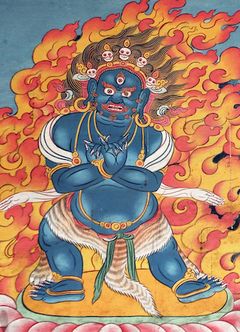Damdrip Nyepa Kunsel
༄༅། །དམ་གྲིབ་ཉེས་སེལ་རྒྱུན་ཁྱེར་བཞུགས། །
A Brief Daily Practice of Damdrip Nyepa Kunsel
arranged by Trulshik Rinpoche
སྔོན་འགྲོ་སྐྱབས་སེམས་ནི།
The Preliminaries: Refuge and Bodhicitta
མཆོག་གསུམ་བླ་མར་སྐྱབས་སུ་མཆི། །
chok sum lamar kyab su chi
In the guru and Three Jewels, I take refuge.
འགྲོ་ལ་ཕན་ཕྱིར་སྨེ་བརྩེགས་བསྒོམ། །
dro la pen chir metsek gom
For the benefit of all beings, I shall meditate on Ucchuṣma.1
ལན་གསུམ།
Three times
དངོས་གཞི་ནི།
Main Practice
སྟོང་པའི་ངང་ལས་སྐད་ཅིག་གིས། །
tongpé ngang lé kechik gi
From the state of emptiness, instantly,
སྣ་ཚོགས་པད་ཉིའི་གདན་སྟེང་དུ། །
natsok pé nyi den tengdu
Upon lotus and sun disc seats,
རང་ཉིད་ཁྲོ་ཆེན་སྨེ་བརྩེགས་ནི། །
rangnyi tro chen metsek ni
I appear as the great wrathful Ucchuṣma,
མཐིང་ནག་འོད་ཟེར་ཀུན་འཕྲོ་བ། །
ting nak özer kün trowa
Dark blue in colour and emanating rays of light,
ཕྱག་གཉིས་ཐུགས་ཀར་སྡིགས་མཛུབ་མཛད། །
chak nyi tukkar dikdzub dzé
With two hands at my heart displaying the threatening mudrā,
ཁྲོ་བོའི་ཆ་ལུགས་རྫོགས་པར་བསྒོམ། །
trowö chaluk dzokpar gom
And complete with all the attributes of a wrathful heruka.
གནས་གསུམ་ཡི་གེའི་འཕྲོ་འདུ་ལས། །
né sum yigé trodu lé
Through the emanation and reabsorption of syllables at my three centres,
ཞི་ཁྲོའི་ཚོགས་ཀུན་སྤྱན་དྲངས་ཐིམ། །
zhitrö tsok kün chendrang tim
All the peaceful and wrathful ones are invited and dissolve into me.
ཐུགས་ཀར་པད་ཉིར་ཧཱུྃ་མཐིང་མཐར། །
tukkar pé nyir hung ting tar
At my heart upon a lotus and sun disc is a blue syllable hūṃ,
བཟླས་སྔགས་འགལ་མེའི་འཁོར་ལོ་བཞིན། །
dé ngak galmé khorlo zhin
Surrounded by the mantra, whirling like a blazing firebrand.
མེ་ཡི་ཚྭ་ཚྭ་འཁྲུག་ཅིང་འཕྲོ། །
mé yi tsatsa truk ching tro
As I recite the mantra, sparks of flame flicker and shoot out
གནོད་བྱེད་ཉམས་ཆག་ཀུན་བསྲེག་གྱུར། །
nöjé nyamchak kün sek gyur
To burn away completely all harm and breakages of samaya.
ཨོཾ་ཨུཤྩི་ཊ་ཡ་ཏོར་ཡ་ཏོར་ཡ་སྭཱ་ཧཱ། ཨུ་ཊ་མི་ཊ་ཡ་ཏོར་ཡ་ཏོར་ཡ་སྭཱ་ཧཱ། མོན་ཊ་ཀྲོ་ཏ་ཡ་ཏོར་ཡ་ཏོར་ཡ་སྭཱ་ཧཱ། ཨ་ཀོ་ཀྲོ་ཏ་ཡ་ཏོར་ཡ་ཏོར་ཡ་སྭཱ་ཧཱ། ཨ་བྷུ་ཀྲོ་ཏ་ཡ་ཏོར་ཡ་ཏོར་ཡ་སྭཱ་ཧཱ། ཨུ་ཊ་ཤ་ཏ་ཡ་ཏོར་ཡ་ཏོར་ཡ་སྭཱ་ཧཱ། ཨེ་ལིང་ཨེ་ཊ་ཡ་ཏོར་ཡ་ཏོར་ཡ་སྭཱ་ཧཱ། ལ་མོན་ཊ་ཡ་ཏོར་ཡ་ཏོར་ཡ་སྭཱ་ཧཱ། ཨས་ནི་པིས་ནི་ཊ་ཡ་ཏོར་ཡ་ཏོར་ཡ་སྭཱ་ཧཱ། ཨོཾ་བྷུར་ཀུར་མ་ཧཱ་པྲ་ཎ་ཡེ་བྷུར་ཙི་བྷུར་ཀུ་བི་མ་ལེ་ཨུ་ཙུཥྨ་ཀྲོ་དྷ་ཧཱུྂ་ཕཊ་ཏོར་ཡ་ཏོར་ཡ་སྭཱ་ཧཱ།
om utsitaya torya torya soha | uta mitaya torya torya soha | mönta krotaya torya torya soha | ako krotaya torya torya soha | abhu krotaya torya torya soha | uta shataya torya torya soha | eling etaya torya torya soha | lamön taya torya torya soha | eni pini taya torya torya soha | om bhurkur maha pranayé bhurtsi bhurku bimalé utsukma krodha hung pé torya torya soha
ཞེས་ཉམས་གྲིབ་ཆེན་པོ་ལ་བརྒྱ། འབྲིང་ལ་བདུན་ནམ་ཉེར་གཅིག ཆུང་ངུ་ལ་བདུན་བཟླས་ལ་སྣ་བུག་ཏུ་ཕུས་བཏབ་པས། ཉམས་གྲིབ་ཐམས་ཅད་ཉི་མས་མུན་པ་ལྟར་འཇོམས་པར་གསུངས་སོ། །
For major defilements recite the mantra one hundred times. For average defilements recite it seven or twenty-one times, and for minor defilements recite it seven times. It is said that by reciting this and blowing into your nostrils, all defilements and impairments will be vanquished like the sun dispelling darkness.
རྗེས་ནི།
Conclusion
དགེ་འདིས་ཉམས་གྲིབ་ཀུན་སེལ་ནས། །
gé di nyamdrib kün sel né
Through this merit, may all defilements and impairments be eliminated,
འགྲོ་ཀུན་ཕན་བདེའི་དཔལ་དུ་ཤོག །
dro kün pendé pal du shok
So that all beings may enjoy the splendour of benefit and happiness.
ཅེས་རྩ་གཞུང་ལ་ཐོག་མཐའི་ཟུར་བརྒྱན་པ་པོ་ཝཱ་གིནྡྲ་དྷརྨ་མ་ཏིས་སོ།། །།
Vāgindra Dharmamati (Kyabjé Trulshik Rinpoche) added the beginning and the conclusion as an adornment to the basic text.
- ↑ Ucchuṣma (Tib. sem brtsegs) is a wrathful form of Vajrapāṇi. The Sanskrit is sometimes given as Bhurkuṃkūṭa.
